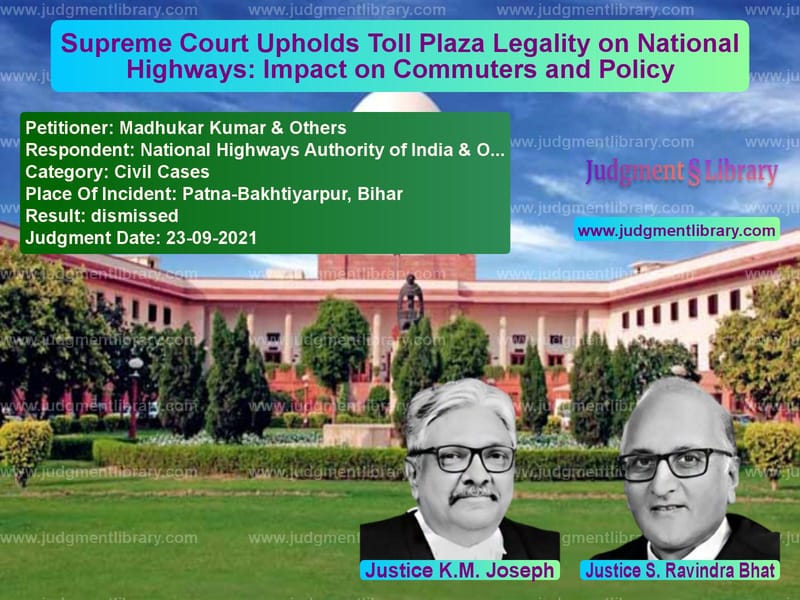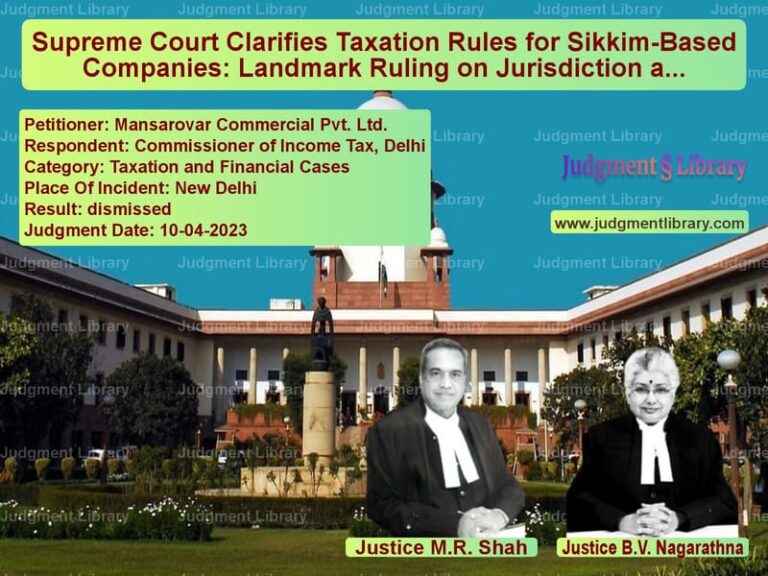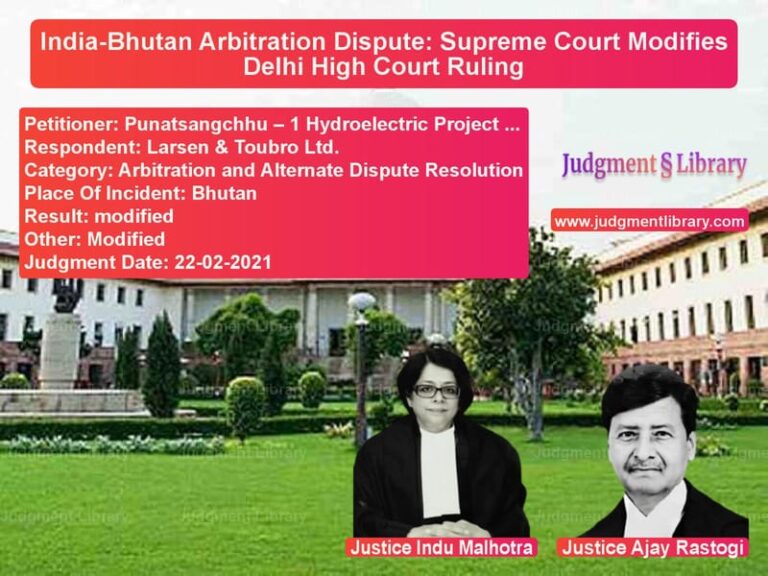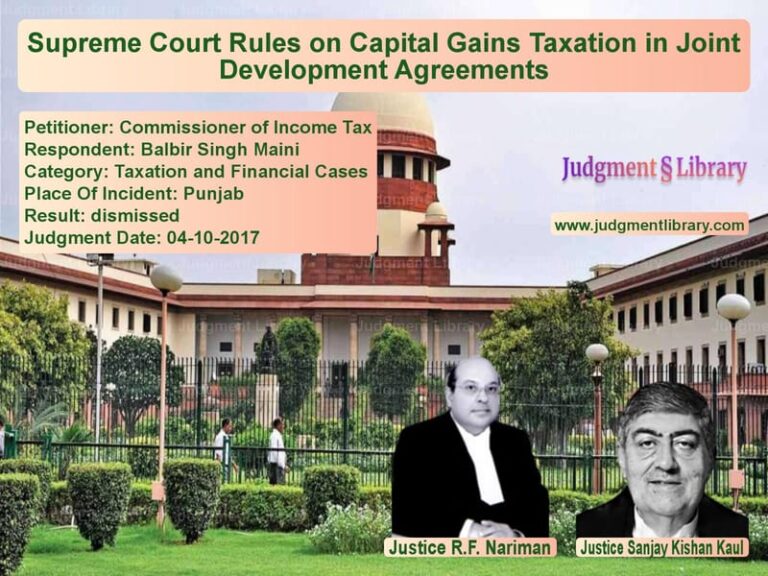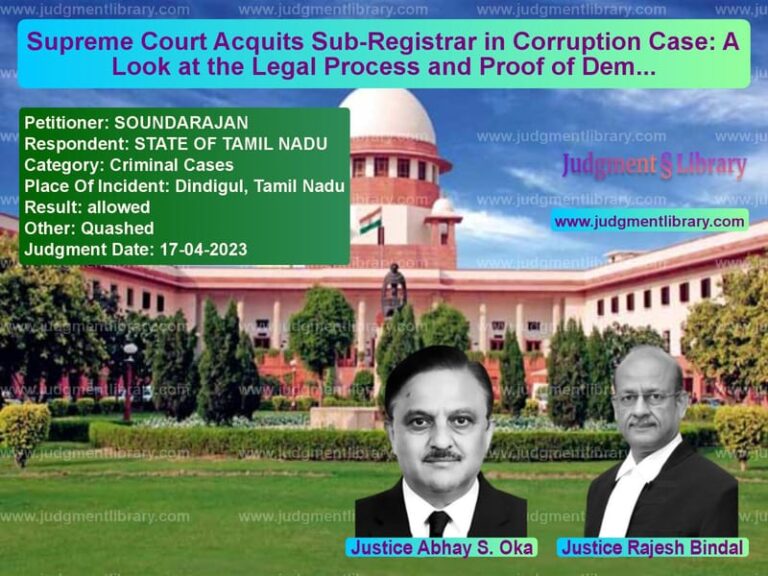Supreme Court Upholds Toll Plaza Legality on National Highways: Impact on Commuters and Policy
The case of Madhukar Kumar & Others v. National Highways Authority of India & Others brought into question the legality of a toll plaza constructed at the 194 km milestone on National Highway 30 (NH30) as part of the four-laning of the Patna-Bakhtiyarpur section. The Supreme Court was tasked with interpreting the National Highways Fee (Determination of Rates and Collection) Rules, 2008, and whether the placement of the toll plaza violated the rights of local residents under Rule 8.
The petitioners challenged the construction of the toll plaza on the grounds that it was located within municipal limits and imposed an unfair financial burden on residents who needed to cross it frequently. They contended that the placement of the toll plaza violated legal provisions and should be relocated to a more suitable area outside municipal boundaries. The National Highways Authority of India (NHAI), however, defended its decision, arguing that the location was legally justified and necessary for revenue collection.
Background of the Case
The dispute arose after the Government of India, through NHAI, undertook the four-laning of NH30 between Patna and Bakhtiyarpur. The project was part of an effort to improve road infrastructure and facilitate smoother traffic flow in Bihar. A key component of the project was the installation of a toll plaza to collect user fees for the newly constructed section. However, this toll plaza was set up within municipal limits, prompting local residents to challenge its legality.
The petitioners, who were regular commuters on NH30, claimed that the placement of the toll plaza caused severe inconvenience and financial hardship. According to them, Rule 8 of the National Highways Fee (Determination of Rates and Collection) Rules, 2008, explicitly prohibits the establishment of a toll plaza within 10 km of municipal limits unless specific conditions are met.
Key Issues Before the Supreme Court
- Does the establishment of a toll plaza within municipal limits violate Rule 8 of the National Highways Fee Rules?
- Were the interests of local residents considered while determining the toll plaza’s location?
- Does NHAI have discretionary powers to set up toll plazas irrespective of municipal boundaries?
- Should the toll plaza be relocated outside municipal limits?
Arguments by the Petitioners
The petitioners contended that:
- The placement of the toll plaza was illegal as it was within the municipal limits of Patna, directly affecting thousands of local residents.
- Frequent users of the road, such as students, office workers, and traders, were unfairly burdened with toll charges for short-distance travel.
- The toll collection was a violation of Rule 8, which stipulates that a toll plaza must not be located within 10 km of a municipal or town area unless the road stretch is primarily for local residents.
- The location of the toll plaza favored commercial users over daily commuters, making it an unjust imposition on the local population.
Arguments by NHAI and Respondents
NHAI and the Government of Bihar defended the toll plaza’s location, arguing that:
- The decision was taken after careful assessment and in compliance with legal provisions.
- The section of NH30 passing through municipal limits had been upgraded to facilitate smoother movement for local residents, which justified the toll plaza’s location.
- Rule 8 allows an exception for placing a toll plaza within municipal limits if the upgraded highway primarily benefits local users.
- Relocating the toll plaza outside municipal limits would significantly reduce revenue collection, affecting maintenance and further improvements.
Supreme Court’s Analysis
The Supreme Court, comprising Justices K.M. Joseph and S. Ravindra Bhat, carefully examined the petitioners’ objections and the counterarguments provided by NHAI. The Court analyzed the provisions of the National Highways Fee Rules and relevant precedents before arriving at its decision.
Read also: https://judgmentlibrary.com/supreme-court-clarifies-res-judicata-in-wakf-property-dispute/
Key Findings
- Rule 8 Provides Exceptions: The Court acknowledged that while Rule 8 generally prohibits toll plazas within 10 km of municipal limits, an exception exists when a road stretch is developed primarily for local residents. The Court found that nearly 14 km of the upgraded NH30 fell within this category.
- Plaza Placement Was Lawful: The Supreme Court ruled that the toll plaza’s location was not arbitrary and had been set up in accordance with statutory provisions.
- Financial Burden vs. Infrastructure Development: The Court noted that while toll charges impose costs on commuters, they are necessary for sustained infrastructure development. It held that revenue generation through toll collection is an accepted practice worldwide and does not inherently violate fundamental rights.
- No Evidence of Malafide Intent: The petitioners failed to establish that the placement of the toll plaza was intended to discriminate against local residents or cause undue hardship.
Key Observations by the Supreme Court
“The mere fact that a toll plaza is located within municipal limits does not automatically render it illegal. Rule 8 provides for an exception where the development of the highway primarily benefits local residents.”
“While citizens have a right to free movement, tolls are a necessary means to finance road infrastructure projects. Judicial interference is warranted only when there is a clear violation of statutory provisions.”
Final Judgment
The Supreme Court ruled:
- The location of the toll plaza was legally justified under the exceptions provided in Rule 8.
- The petitioners’ request for the removal of the toll plaza was dismissed.
- NHAI was directed to ensure that regular commuters are given monthly passes to reduce financial burdens.
Implications of the Judgment
This ruling has significant implications:
- Clarification of Toll Plaza Rules: The judgment reinforces that toll plazas within municipal limits are not illegal if they meet the criteria under Rule 8.
- Protection of Public Infrastructure Projects: It ensures that toll collections remain a sustainable method for funding national highway development.
- Judicial Restraint in Policy Matters: The Court reiterated that it will not intervene in policy decisions unless there is clear evidence of legal violations.
Conclusion
The Supreme Court’s decision in Madhukar Kumar v. National Highways Authority of India provides a comprehensive interpretation of Rule 8 of the National Highways Fee Rules, balancing infrastructure development needs with commuter concerns. The ruling ensures that toll collections remain legally sound while emphasizing fairness for local residents through discounted passes.
Read also: https://judgmentlibrary.com/supreme-court-enhances-compensation-in-noida-land-acquisition-case/
Petitioner Name: Madhukar Kumar & Others.Respondent Name: National Highways Authority of India & Others.Judgment By: Justice K.M. Joseph, Justice S. Ravindra Bhat.Place Of Incident: Patna-Bakhtiyarpur, Bihar.Judgment Date: 23-09-2021.
Don’t miss out on the full details! Download the complete judgment in PDF format below and gain valuable insights instantly!
Download Judgment: madhukar-kumar-&-oth-vs-national-highways-au-supreme-court-of-india-judgment-dated-23-09-2021.pdf
Directly Download Judgment: Directly download this Judgment
See all petitions in Consumer Rights
See all petitions in Contract Disputes
See all petitions in Judgment by K.M. Joseph
See all petitions in Judgment by S Ravindra Bhat
See all petitions in dismissed
See all petitions in supreme court of India judgments September 2021
See all petitions in 2021 judgments
See all posts in Civil Cases Category
See all allowed petitions in Civil Cases Category
See all Dismissed petitions in Civil Cases Category
See all partially allowed petitions in Civil Cases Category

